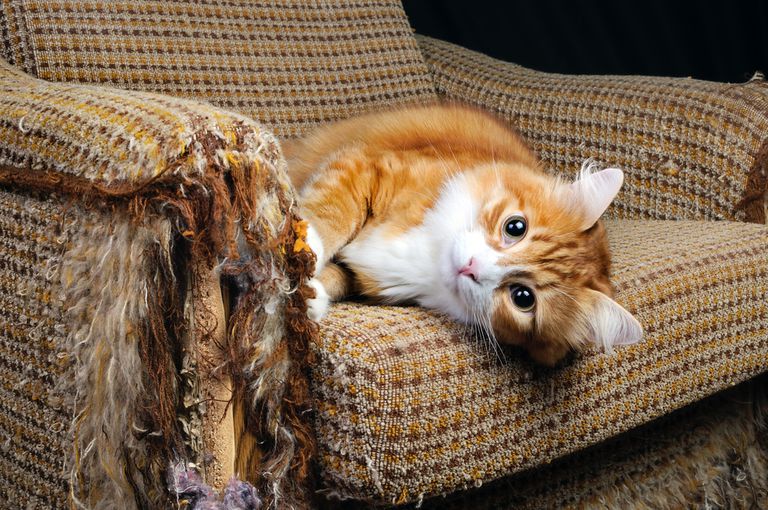
Cats scratch furniture for a number of reasons. Scratching is a good form of exercise for them. They get to stretch out their bodies and extend and retract their nails. When they scratch, the movements help remove the outer nail sheaths. Cats also scratch to leave visual and olfactory (scent) markers. Their interdigital glands, which are located between the pads of their paws, leave odors behind so that other cats know that the “marker” cat has been in the area. When cats scratch objects, they also leave small gouges, which are visual signals to other cats that there is a cat in the area.
Some cats also may scratch furniture because they are not provided with adequate scratching posts. Other cats have developed a preference for particular materials, such as the expensive fabrics that our couches and armchairs are made from! The location of certain furniture may make it a great place for cats to provide a visual signal or get a good scratch in after waking from a nap. In the wild, scratching sites are usually located in areas where the cats spend a fair portion of their time.
What to Do?
- Place a scratching post right next to the furniture the cat is currently scratching.
- Deter the cat from scratching furniture by placing double-sided sticky tape on it. Many cats find the stickiness of the tape unpleasant.
- Praise and offer food rewards whenever your cat scratches her scratching post. You can use clicker training to capture the cat as she is engaging in appropriate scratching behavior to teach her to scratch on the preferred objects.
- Offer a variety of scratching substrates; don’t offer just one carpeted scratching post. For example, also offer one of the inexpensive cardboard scratching posts or one made from sisal rope. I often recommend an untreated wooden log, which is what many cats scratch in the wild. However, you need to make sure this “au naturel” scratching post is secure, so it can’t tip over and injure your cat. Sometimes, I have the owner buy fabric similar to the furniture the cat likes to scratch and make their own scratching posts. Then I have the owner leave a deterrent, like sticky tape, on the actual furniture and place the new scratching post next to the furniture. As the cat starts to scratch the new scratching post, the owner can slowly move the post to a more desirable location.
And remember, if you’ve tried all these recommendations and your cat is still “redecorating” the furniture, seek professional help from your veterinarian.

Leave a comment
This site is protected by hCaptcha and the hCaptcha Privacy Policy and Terms of Service apply.